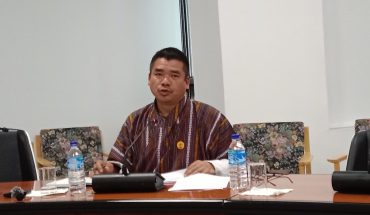
Most youth report better pay abroad but face challenges with contracts, long hours, and welfare issues
TIL BDR GHALLLEY
Thimphu
A recent monitoring survey has found that career growth and financial challenges remain the primary reasons Bhutanese youth seek overseas employment, with many reporting improved earnings but only moderate job satisfaction amid challenges related to salary delays, long working hours, and contract discrepancies.
As unemployment and underemployment continue to affect many youths in Bhutan, overseas employment has become a crucial pathway for income and experience despite the risks and uncertainties involved.
The survey, conducted by the Department of Employment and Entrepreneurship under the Ministry of Industry, Commerce and Employment, collected responses from 1,054 Bhutanese Overseas Workers currently working in Kuwait, Qatar, Bahrain, and the United Arab Emirates.
Among the respondents, 47 percent cited career growth as their reason for seeking work overseas, while an equal percentage pointed to low wages in Bhutan, and 46 percent identified financial difficulties as a major factor influencing their decision to migrate for work.
Before leaving Bhutan, nearly half of the workers were unemployed, while many others earned between Nu. 10,000 to 15,000 per month.
In contrast, many now earn between Nu. 30,000 to 50,000 in their overseas placements, with 45 percent stating that their current salaries are significantly higher than what they previously earned in Bhutan.
Young people form the majority of Bhutanese workers abroad, with 48 percent aged between 25 and 29 years, while 30 percent are aged between 20 and 24 years.
Female participation in overseas employment is higher, making up 63 percent of the respondents, which reflects the demand for workers in retail and hospitality sectors overseas.
The report found that 70 percent of Bhutanese workers abroad are employed in the services and sales sectors.
Kuwait has emerged as the top destination for Bhutanese overseas workers, employing 63 percent of the respondents, followed by Qatar at 26 percent, while smaller numbers are working in the United Arab Emirates and Bahrain.
According to the survey, 90 percent of the respondents received pre-departure briefings, while 83 percent attended additional sessions conducted by employment agents before leaving Bhutan.
However, many workers highlighted the need for more detailed briefings on host country laws, cultural norms, workplace expectations, and procedures for addressing grievances, indicating that existing orientations may not fully prepare workers for their new environments.
Although 92 percent of the workers reported understanding the terms of their contracts before departure, some experienced discrepancies upon arrival, including changes in job roles, contract periods, and lower-than-promised salaries.
A number of workers also reported that their passports were withheld by employers, making it difficult to change jobs or return home when needed.
Welfare satisfaction varied among respondents. Transportation allowances received the highest average rating at 3.12 out of 5, while salary increments and overtime payments received lower ratings of 2.22 and 2.49, respectively.
Accommodation and medical insurance received moderate satisfaction ratings, showing areas where improvements could be made to enhance workers’ welfare abroad.
Workers reported facing challenges such as delayed or unpaid salaries, long working hours, and concerns related to employer behaviour.
Those who secured employment independently, without the support of formal agencies, reported difficulties with high upfront costs for visas and travel, limited legal support in case of disputes, and problems related to non-transferable visas, which restricted their ability to change employers if necessary.
Some workers shared that the roles they were given upon arrival were different from what they were promised, requiring them to handle additional responsibilities such as deliveries and cleaning alongside sales duties.
Others faced difficulties in finding stable housing and managing high living costs during the initial months abroad.
The survey revealed that a significant number of Bhutanese workers, about 64 percent, are unaware of the National Reintegration Program, which is designed to support returning workers in settling back into Bhutanese society and the workforce.
Regarding future plans, 32 percent of workers indicated that they plan to return to Bhutan to seek employment, while 30 percent wish to start their own businesses, and 24 percent plan to continue working overseas.
The report noted gender differences, with women showing a preference for government jobs upon returning to Bhutan, while men expressed a stronger interest in pursuing self-employment and entrepreneurship opportunities.
The report also suggested that there is a need to strengthen pre-departure briefings with detailed, country-specific guidance on legal, cultural, and workplace conditions to better prepare Bhutanese workers for overseas employment.
It further highlighted the need to enhance monitoring of working conditions and legal protections for Bhutanese workers abroad while ensuring transparency in recruitment practices by employment agencies.
The findings indicate the importance of increasing awareness of reintegration programs to support returning workers and of creating more domestic employment opportunities in Bhutan to reduce dependency on overseas jobs.





